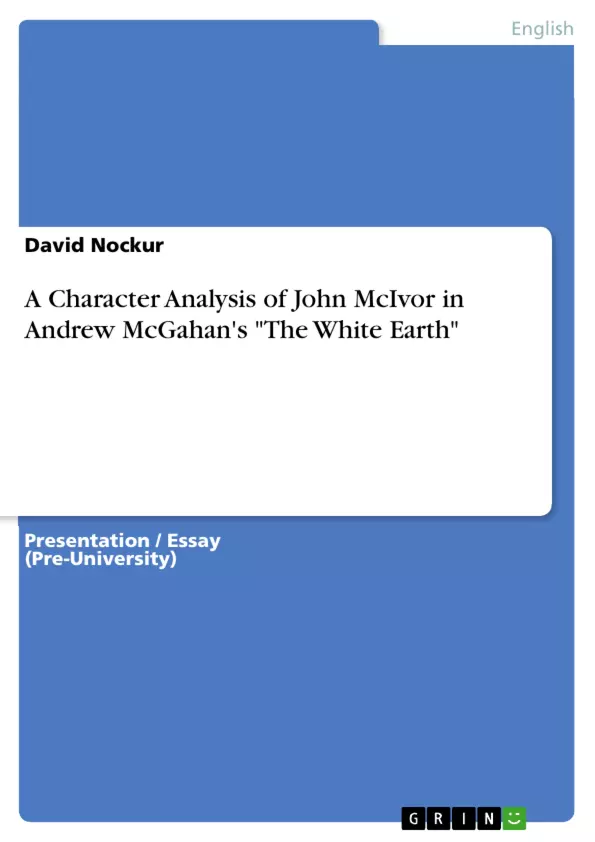This essay provides an analysis of John McIvor, a character from John McGahan's 2004 novel The White Earth.
John McIvor is a man of enormous drive and determination. It is the intimate bond with Kuran Station that propels his relentless strife throughout the novel, first to acquire it, then to keep it for himself. This paper will briefly outline the causes of this defining character trait of his and then discuss its consequences for John McIvor’s personal relationships. Towards the end, the generational conflict that ensues between John and his daughter Ruth will be put into the context of the major themes of The White Earth.
It stands to reason that the vigor that he pursues his aim with stems from a deep seated psychological need, acquired during childhood and completely internalized by the time John reaches adulthood. Accordingly, in The White Earth the question of ownership is already raised in John’s earliest childhood experiences.
Inhaltsverzeichnis (Table of Contents)
- John Mclvor's Drive and Determination
- John's Childhood and the Seed of Ownership
- The First Encounter with Elizabeth White
- The Loss of Kuran Station and its Impact on John
- The Resurfacing Obsession with Kuran Station
- John Mclvor's Campaign against Native Title Legislation
- The Injustice of Ownership
- The Family Feud of the Mclvors
Zielsetzung und Themenschwerpunkte (Objectives and Key Themes)
This paper aims to analyze the defining character trait of John Mclvor's relentless drive and determination, examining its origins and consequences for his personal relationships. The paper will also explore the generational conflict between John and his daughter Ruth within the context of the major themes of The White Earth.
- The Significance of Ownership and its Impact on Individual Identity
- The Role of Personal Relationships in Shaping Character and Motivations
- The Conflict Between Individual Desire and Societal Norms
- The Injustice of Ownership and the Power of Subjective Perception
- The Generational Divide and the Legacy of Family History
Zusammenfassung der Kapitel (Chapter Summaries)
- John Mclvor's Drive and Determination: This section introduces John Mclvor as a man driven by a relentless desire to acquire and maintain Kuran Station. The paper examines the origins of this trait in John's childhood experiences and its impact on his personal relationships.
- John's Childhood and the Seed of Ownership: This section delves into John's upbringing, highlighting his father's ambition to elevate him into the aristocracy by securing Kuran Station through a marriage with Elizabeth White. The seed of ownership is sown in John's mind, shaping his perceptions and aspirations.
- The First Encounter with Elizabeth White: This section explores John's initial encounter with Elizabeth White, emphasizing the class barriers and the sense of divine detachment surrounding her. John's internal struggle against objective reality and his unwavering belief in his destined future are examined.
- The Loss of Kuran Station and its Impact on John: This section narrates the dramatic turn of events where Elizabeth White denies John his inheritance and sells Kuran Station. The profound impact of this loss on John's psyche is highlighted, leaving him in a state of shock and depression.
- The Resurfacing Obsession with Kuran Station: This section depicts John's re-encounter with Kuran Station, highlighting the resurfacing of his obsession and the pain of seeing it in its dilapidated state. John's inability to communicate his deepest motives and his self-identification with the Kuran property are explored.
- John Mclvor's Campaign against Native Title Legislation: This section focuses on John's political activism against native title legislation, revealing his hypocrisy and the inconsistency between his actions and his professed beliefs about ownership and justice.
Schlüsselwörter (Keywords)
Key themes and concepts explored in The White Earth include ownership, identity, justice, ambition, generational conflict, personal relationships, subjective perception, and societal norms. The novel delves into the complexities of these themes through the story of John Mclvor and his lifelong obsession with Kuran Station.
- Arbeit zitieren
- David Nockur (Autor:in), 2016, A Character Analysis of John McIvor in Andrew McGahan's "The White Earth", München, GRIN Verlag, https://www.grin.com/document/371405



